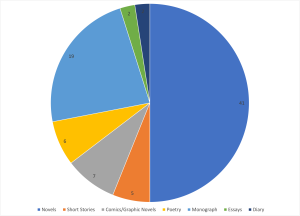The recent release of Eli Pariser’s The Filter Bubble (see also his TED talk about the book) gives me hook to talk about an idea, or maybe a set of ideas, that I have been thinking about for several months now. The argument of the book is that search engines like Google and Bing, and other kinds of web services that aggregate content, tailor their results to some notion of our preferences, tastes, and interests, and that while this is obvious in the case of RSS readers or twitter feeds (which after all we configure ourselves for just this purpose), in the case of search engines we are generally unaware that this is happening and of how the results are being shaped. In other words, if you and I Google the same thing, we will get different results, and most of us are not really aware of this. We think of Google as, in some sense, “objective,” giving us the whole story, or at least the same one.
Pariser’s point is that as we get more and more of our information about the world from the internet, this kind of tailoring of feeds and search results means we run the risk of finding ourselves inside bubbles created by the filters that we applied— or that are applied for us— for sorting information, and that this is dangerous. It increases the distance between people of different political or ideological perspectives, and it allows us to ignore things which might be less interesting to us, or even unpleasant, but which we might still need to know about. (In the TED talk, he uses the metaphor of vegetables and dessert; filters allow us to eat nothing but dessert).
So it seems to me that this is an example of a broader phenomenon, and in order to show that I want to tie Pariser’s arguments to the (possible) decline of the Liberal Arts education in the U.S.
The argument against Liberal Arts is a familiar one, not least because it is in essence the same one college freshman always voice about general education requirements. It says that college is expensive (undeniably true), and that kids should not have to “waste” time and money taking classes that have nothing to do with what they want to study or the career path they’ve chosen. Proposals have been made to do away with requirements outside the degree altogether, and allow incoming freshman to direct themselves according to what is most relevant or necessary for them.
There are (at least) a couple of problems with these critiques. First is the underlying assumption that 18-year-olds just out of high school are in a position to make choices that will affect the rest of their lives.
Maybe more important, though, is the idea that learning only things that pertain in a direct and obvious way to one’s interests or vocation can constitute a “good education.” The implicit idea here is that college (and education more generally) is about data, about getting the right information into one’s head. From that perspective, it makes sense to say that those extra classes are a distraction. But this is not the right way to think about college.
I have taught a number of college courses, at different schools and different levels. In every single case, the quantity of information that is directly relevant to the class vastly exceeds what we can actually cover. This is one reason for assigning research papers— so that students are exposed to more than what is in the assigned readings. But the primary goal of every class, and of the complete series of classes in the aggregate, is more to help students acquire the ability to locate, understand, and work with new information. That is what they will have to do in whatever career they choose, and even more generally what we all have to do just to get through the day. To be sure, having some level of background knowledge, some kind of baseline, is also a necessary part of this; and different fields have different baselines. But we are, or should be, most concerned with skills, the kinds of things we label under headings like “critical thinking” or “communication.” Stuffing a kid’s head full of data is a useless exercise if they don’t know what to do with it once it’s there.
The liberal arts education is a necessary part of this project in at least two ways. First, because the kinds of classes that usually fulfill gen. ed. requirements are precisely the ones that ask you to read and write more— precisely the activities that are most conducive to the development of critical thinking and communication skills. If you’re already, say, and English of Philosophy major, the principle still holds; those math and science classes will (should) assure basic numeracy, familiarity with the scientific method and standards of evidence, etc., all of which is, again, important for being able to understand and deal with the world around you.
Second, the breadth of liberal arts education is important because of the filter bubble effect. Liberal arts forces students to go outside their comfort zones, take classes in areas with which they are not already familiar. A student who takes a lot of chemistry in high school, then goes to college to major in chemistry (and the same thing is true for any field), is going to have a very lopsided view of the world if not required to work outside of that particular bubble. As Pariser suggests, we all need vegetables as well as dessert; that different people see different things as vegetables doesn’t change anything.
Moreover, much of the way we actually make use of information in our personal and professional lives has to do with making connections between things that may have no obvious relationship— or thinking of relationships besides the obvious one. We are much more likely to be able to do this if our stock of knowledge is broad and varied, and if our education has given us the skills we need to make those connections (again, “critical thinking”).
(Note that I’m not talking about the evidence that having to learn lots if different kinds of information has positive cognitive effects. That aspect of this is controversial, and I think the argument stands without it).
This is not simply about being a “well-rounded” person; again, it is about being able to deal with the world around you and the people in it. It is about being familiar with different ways of making and evaluating arguments, using evidence, and communicating with people with different kinds and levels of knowledge. There’s no education that can prepare you for every problem of this kind, but breadth is vital. In a culture and an economy in which we are more and more specialized, making the four years (or so) of college less so is more than important, because all those specialists have to be able to talk to and work with one another, both professionally and as people.
In a way, this is what this blog is (I hope) gong to be about: the idea that connections between ideas are as important as the ideas themselves, and that we rarely if ever know beforehand where such connections might be made— that while there may be lots of things you don’t “need” to know, there are very few things that it won’t be useful to know, sometime, somewhere.


